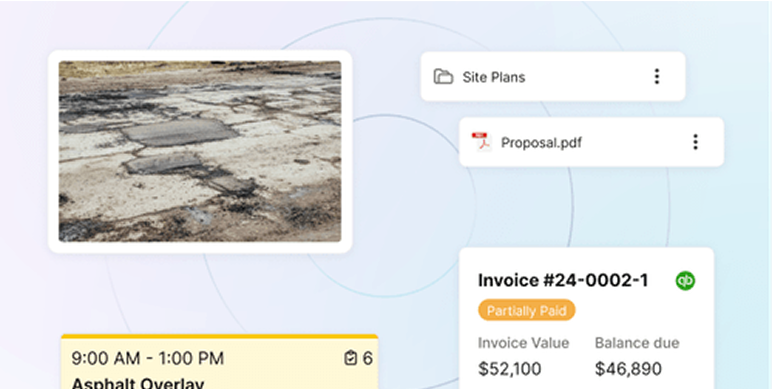Sustainable Asphalt: Green Solutions for Paving Contractors
Sustainability is changing the construction industry as contractors face growing pressure to reduce environmental impact.
Traditional asphalt production generates significant emissions, consumes large amounts of energy, and produces material waste that typically ends up in landfills. These challenges create cost pressures and regulatory compliance issues for eco-conscious projects.
This guide explores sustainable asphalt solutions, including recycled materials like RAP and warm-mix asphalt that reduces production temperatures by 30–120°F, and bio-based alternatives.
You'll also learn about OneCrew, a practical project management tool that helps paving contractors track sustainability metrics and deliver greener projects more efficiently.
What Is Sustainable Asphalt?
Sustainable asphalt is pavement designed to minimize environmental impact through recycled materials, reduced energy consumption, and extended lifespan. These eco-friendly approaches maintain durability while cutting emissions and waste.
Key benefits of sustainable asphalt include:
- Lower carbon footprint through recycled content and reduced production temperatures
- Extended pavement life with proper maintenance and quality materials
- Cost savings from using reclaimed materials and energy-efficient processes
- Improved stormwater management with permeable designs
- Compliance with green building standards and municipal sustainability requirements
Types of Sustainable Asphalt Solutions
Sustainable asphalt solutions range from recycled pavement materials to bio-based additives and permeable designs. Each approach offers specific environmental benefits while addressing different project requirements and budgets.
Reclaimed Asphalt Pavement (RAP)
Reclaimed Asphalt Pavement transforms old pavement into new sustainable asphalt by milling existing surfaces and incorporating the material into fresh mixes.
RAP offers significant cost savings since recycled materials cost less than virgin aggregates and asphalt binder. The process reduces landfill waste while maintaining pavement performance when properly designed.
However, RAP content must be carefully balanced, as too much recycled content can reduce workability and require extra rejuvenating agents to restore flexibility. For contractors looking to maximize recycled content, our asphalt recycling guide provides implementation strategies.
Warm-Mix Asphalt (WMA)
Warm-Mix Asphalt reduces production temperatures by 50–100°F compared to traditional hot-mix asphalt, cutting energy consumption and emissions during manufacturing. This sustainable asphalt solution maintains performance while offering environmental benefits.
WMA technologies use chemical additives, organic compounds, or water-based processes to achieve lower mixing temperatures.
The reduced heat requirements decrease fuel consumption at asphalt plants and allow for longer hauling distances without temperature loss. Many states now specify WMA for highway projects, driving widespread adoption across commercial and residential applications.
Bio-based and additive-enhanced asphalt
Bio-based asphalt incorporates renewable materials like bio-oils, recycled tire rubber, and plant-based polymers to reduce petroleum dependence while enhancing pavement performance. These additives can improve flexibility, crack resistance, and longevity.
Bio-oils derived from agricultural waste or algae can partially replace traditional asphalt binder, reducing the carbon footprint of new pavements. Recycled tire rubber adds flexibility and helps manage tire waste streams. However, bio-based additives often cost more than conventional materials and may require specialized equipment or handling procedures.
Porous and permeable asphalt
Porous asphalt allows water infiltration through the pavement surface, reducing stormwater runoff and supporting sustainable drainage systems. This green pavement solution works particularly well in parking lots and low-traffic areas where water management is prioritized.
Porous asphalt contains larger aggregate sizes and reduced fine materials, creating interconnected voids that allow water to pass through. The system requires proper sub-base design and regular maintenance to prevent clogging.
Although initial costs run higher than conventional asphalt, porous pavements can eliminate expensive stormwater infrastructure in suitable applications.
Alternative surfaces and driveway materials
Green alternatives to asphalt driveways include permeable concrete, recycled plastic pavers, and hybrid systems that combine sustainable materials with traditional approaches. These options serve property owners seeking alternatives to conventional asphalt.
Permeable concrete offers durability with stormwater benefits, while recycled plastic pavers provide flexibility and unique aesthetics. Hybrid systems might combine recycled asphalt with bio-based binders or alternative aggregates.
Each alternative to asphalt presents trade-offs in cost, appearance, maintenance, and environmental impact that contractors should discuss with clients.
Key Benefits of Sustainable Asphalt Pavements
Sustainable asphalt pavements deliver measurable environmental and economic advantages, such as reduced emissions, cost savings, satisfying regulatory standards, and increased green building compliance.
These benefits affect contractors, property owners, and communities, and often justify higher upfront costs through long-term savings and performance improvements. Said benefits include:
- Reduced greenhouse gas emissions through lower production temperatures, recycled content, and extended pavement life cycles
- Extended pavement lifespan when combined with proper maintenance and quality sustainable materials
- Cost savings from recycling and reuse of existing materials, reducing virgin aggregate and binder requirements
- Meeting regulatory and DOT sustainability standards that increasingly require environmental compliance on public projects
- Improved stormwater management through permeable designs that reduce infrastructure demands
- Enhanced corporate sustainability profiles for property owners pursuing green building certifications
- Better green building compliance for property owners pursuing LEED certification goals and corporate sustainability initiatives.
Challenges and Considerations for Contractors
Contractors face several practical challenges when adopting sustainable asphalt solutions, including higher initial costs, limited material availability, and additional training requirements.
Understanding these considerations helps set realistic expectations and project budgets:
- Higher initial costs compared to traditional asphalt for specialized materials, equipment, or training requirements
- Limited availability of sustainable materials and equipment in some regional markets or during peak construction seasons
- Additional contractor training and specification compliance for new techniques and quality control procedures
- Regional climate impacts on performance, as some sustainable solutions work better in specific temperature and moisture conditions
- Quality control complexity when balancing recycled content, additives, and performance requirements
- Client education needs to justify premium pricing and explain long-term benefits
Note: Proper maintenance extends the life of all asphalt types. Explore techniques in our asphalt maintenance guide.
How Can Asphalt Repaving Be More Sustainable?
Asphalt repaving becomes more sustainable through in-place recycling, strategic maintenance timing, and comprehensive lifecycle planning. These approaches maximize existing pavement value while minimizing environmental impact.
Milling and recycling in place eliminates the need to haul away old pavement and import new materials. Cold in-place recycling (CIR) and full-depth reclamation (FDR) processes can rehabilitate failing pavements using 100% of existing materials plus stabilizing agents. This approach cuts transportation costs, reduces emissions, and often costs less than traditional remove-and-replace methods.
Pairing preventive maintenance with sustainability goals extends pavement life and delays major reconstruction. Strategic sealcoating, crack sealing, and surface treatments applied at optimal timing can double pavement lifespan compared to reactive repairs.
This maintenance-first approach reduces the frequency of energy-intensive repaving cycles.
Real-world example
Several cities have implemented successful green pavement projects that show real-world sustainability benefits. The California Department of Transportation reports that recycled asphalt projects achieve comparable performance to conventional pavements while reducing costs significantly.
Milwaukee's Green Infrastructure program incorporates porous pavement and bioswales to manage stormwater runoff in urban areas.
Note: Quality sealcoating equipment supports sustainable maintenance practices. See options in our sealcoating equipment and best asphalt sealcoating guides.
Ready to Manage Greener Projects with OneCrew?
Better project management leads to greener outcomes, and OneCrew helps paving contractors deliver sustainable asphalt projects more efficiently. OneCrew is built specifically for asphalt and concrete contractors to simplify operations from initial estimates to final invoicing.
Here's why contractors choose OneCrew for sustainable project management:
- Purpose-built for paving contractors: OneCrew understands asphalt workflows, from site mapping to crew dispatch and detailed job costing
- Configurable estimating with material tracking: Build precise estimates that account for RAP content, WMA specifications, and sustainable additive costs
- Simpler project documentation: Keep detailed records of sustainable materials and compliance requirements in one organized platform
- Integrated customer communication: Share project specs, sustainability benefits, and progress updates through the built-in customer portal
- Comprehensive job costing: Track actual material usage and labor efficiency to optimize future sustainable asphalt projects
OneCrew replaces multiple apps and spreadsheets with one unified platform designed for real paving workflows. Contractors can focus on delivering quality, sustainable asphalt work instead of managing separate tools.
Book a demo today to see how OneCrew can help you manage sustainable asphalt projects from lead to invoice.
FAQs
1. What is the most sustainable type of asphalt?
The most sustainable asphalt commonly used in the industry is a mix that incorporates Reclaimed Asphalt Pavement (RAP) with warm-mix production techniques. Typical RAP content in new mixes averages around 20–30%.
Though mixes with up to 50% RAP are possible for base or binder courses, this is not standard for surface pavement. Warm-Mix Asphalt production techniques also reduce energy use by approximately 16–30%.
2. Is recycled asphalt durable?
Recycled asphalt is durable when properly designed and constructed, often matching or exceeding the performance of conventional pavements. Studies show RAP content up to 50% maintains structural integrity and longevity. Proper rejuvenator additives ensure recycled binder maintains flexibility and crack resistance.
3. Does Warm-Mix Asphalt reduce emissions?
Warm-Mix Asphalt reduces emissions by 20–35% compared to traditional hot-mix production due to lower manufacturing temperatures. The reduced energy requirements cut CO2 emissions at asphalt plants and allow extended hauling distances. WMA also produces less visible emissions during construction, improving air quality on job sites.
4. Can contractors get incentives for using sustainable asphalt?
Contractors can access incentives through LEED certification bonuses, municipal green building programs, and some DOT sustainability specifications that include cost premiums. Federal infrastructure funding increasingly favors sustainable practices. Many utilities offer rebates for permeable pavement installations that reduce stormwater loads.
5. What is the lifespan of sustainable asphalt compared to traditional?
Sustainable asphalt lifespan equals or exceeds traditional asphalt when properly designed, typically lasting 15–25 years with appropriate maintenance. High-quality RAP mixes often outperform virgin materials due to work-hardened aggregates. Bio-based additives and proper maintenance can extend service life beyond conventional pavements.
6. Can a platform help track sustainable asphalt use?
Yes, a platform like OneCrew can help track sustainable asphalt use by documenting material specifications, quantities, and compliance requirements in project records. Modern project management platforms allow contractors to maintain detailed sustainability data for client reports and regulatory compliance. Digital tracking ensures accurate documentation of RAP percentages, WMA usage, and environmental benefits.


